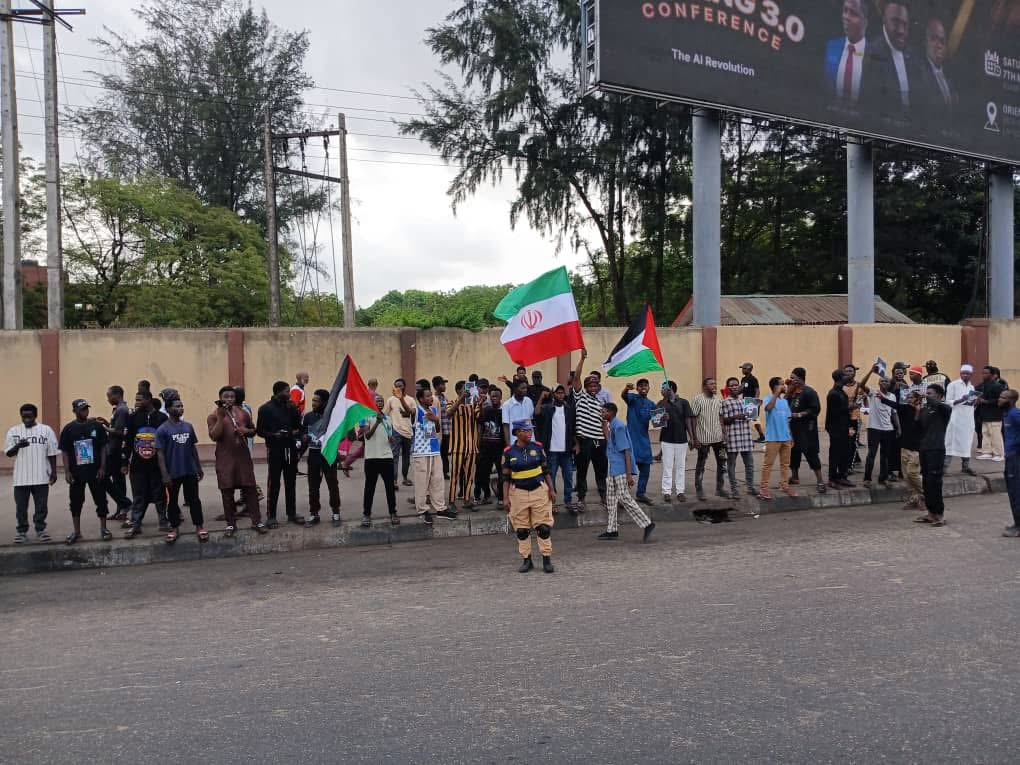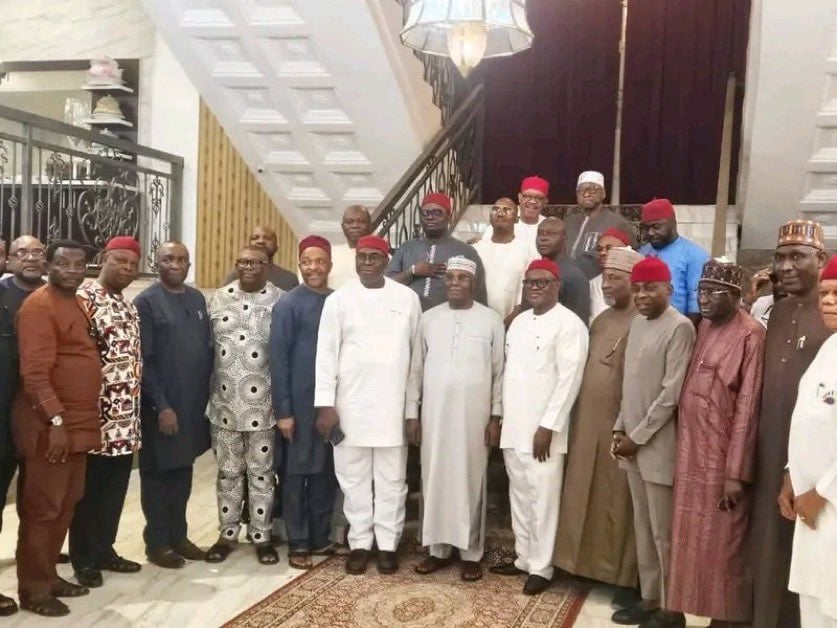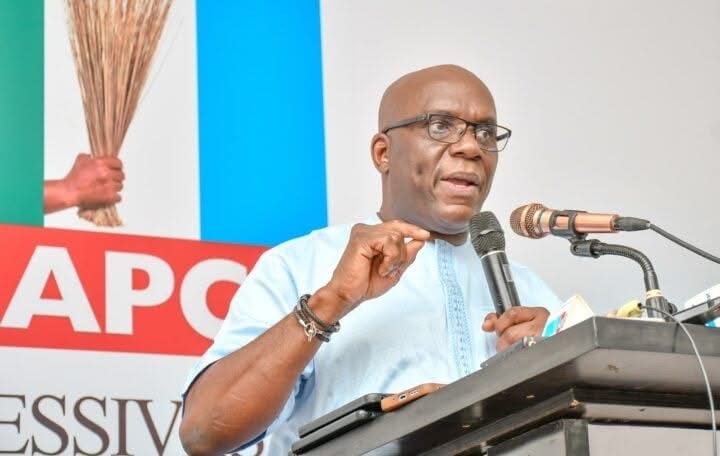The People’s Democratic Party has written the Chief Justice of Nigeria, Justice Tanko Muhammed to recuse himself from the review of the judgement on Imo State governorship election.
The letter, which was signed by Uche Secondus, the National Chairman and Ibrahim Tsauri, the National Secretary, also requested other justices of the Apex Court, who sat on the case to withdraw themselves
The justices are Kayode Ariwoola, Amina Augie, Kudirat Kekere-Ekun, Sylvester Ngwuta ,Uwani Musa Abba Aji,
THE FULL TEXT
February 14, 2020.
The Chief Justice of Nigeria,
Chief Justice’s Chambers,
Supreme Court of Nigeria,
Three Arms Zone,
Abuja.
My Lord,
RE: S.C. NO. SC/1462/2019
APPEAL NO. CA/OW/EPT/5//2019
PETITION NO. EPT/GOV/IM/08/2019
SENATOR HOPE UZODINMA & ANOR. V. RT. HON. EMEKA IHEDIOHA & 2 ORS.
DEMAND FOR RECUSAL OF JUSTICES THAT HEARD THE EARLIER CASE AND REQUEST FOR A DIFFERENT PANEL TO HEAR THE APPLICATION TO SET ASIDE:
The above subject refers.
2. Your Lordship would recall that a panel of Hon. Justices of the Supreme Court presided by your good self on Tuesday the 14th day of January 2020 delivered judgement on the above appeal. Your Lordship may further recall that on February 5th, 2020 the People’s Democratic Party(PDP) filed an application praying that the judgement of 14th January 2020 be set aside on grounds of nullity of the judgment, among other grounds.
3. The judgement sought to be set aside has generated so much misgiving not only among lawyers but in the general polity as a whole because of the uncertainty it has introduced into our electoral jurisprudence, its potential for crisis in our democracy, the irreconcilability of the calculations contained therein and their resultant effect.
4. At the heat of the moment, the Party addressed a Press Conference and expressed its displeasure and disagreement with the judgement, and called on the Justices that heard the case to recuse themselves during any possible future review of the case that may come before the Court, the Party even went further to ask the President of the Court to even resign! In the words of the PDP Chairman: “In the light of extraordinary circumstances that vitiate that judgment as a product manipulation and a clear coup d’etat against the will of the people of Imo State, we demand that the decision of the Supreme Court on the Imo Governorship Election be reviewed and reversed in the interest of justice. Furthermore we demand that Justice Tanko Mohammed, the CJN and his colleagues on the Imo Governorship Panel recuse themselves…”
5. As a follow up to our earlier call on all members of the Panel to recuse themselves we have now sought to formalise that request or demand. We hereby request that the 7 persons that heard the case earlier, recuse themselves from participating in the consideration of this new application. We are not unmindful of the fact that a litigant cannot dictate to the Court the Panel that should hear its case. However due to the extraordinary circumstances and the nature of this case, we think that our request is a fair one that meets the justice of the case.
6. Consequently, we feel it as our patriotic duty to hereby humbly request that your Lordship constitute a different panel of this great Court (other than the one that delivered the judgement) for the purpose of hearing this application.
7. My Lord, our request is founded on Section 36(1) of the Constitution of the Federal Republic of Nigeria, which guarantees fair hearing to every citizen or entity in the determination of his rights or obligations. Furthermore, the time honoured and tested principles of natural justice, particularly that no man shall be a judge in his own cause is particularly relevant to this solemn request.
8. Allegation of bias or likelihood of bias goes to the root of fair hearing. Denial of right to fair hearing is a logical consequence of bias in any proceeding before a Court or a tribunal. The Constitution of the Federal Republic of Nigeria, 1999 as Amended (Constitution) guarantees the right of an individual to fair hearing. An individual’s right to fair hearing includes the right to have his/her rights and obligations determined by an independent and impartial tribunal. The above is clearly enshrined in Section 36 (1) of the Constitution, which provides as follows: “In the determination of his civil rights and obligations, including any question or determination by or against any government or authority, a person shall be entitled to a fair hearing within a reasonable time by a court or other tribunal established by law and constituted in such manner as to secure its independence and impartiality…”
The right to an independent and impartial tribunal is a major factor in determining if fair hearing has been observed by a Court.
The relevant question on the issue of bias is what an ordinary man on the street would think about the fairness of the proceedings conducted by judges accused of likelihood of bias. We may even be wrong on the allegations made against the learned justices of the Supreme Court that sat on the case in question. We may have been bitter about the clearly observed inadequacies in that judgment, but this is now beside the point. The relevant question is: can any reasonable person who heard the Press Conference and several protests by the Party, PDP, the Civil Society Organisations and Nigerians generally, all over the country, including foreign embassies, the involvement of even the international community, feel that the same panel that has been the subject of these allegations, rightly or wrongly by the Party, can sit and deliver impartial justice on the same case on review? We think not.
9. How can we prove or determine that a judicial officer is biased. How is likelihood of bias by a judicial officer determined? This question was answered in Metropolitan Properties v. Lannon [1969] 1 QB 577 at 599, by Lord Denning M.R. where he said:
“…the court does not look at the mind of the justice himself or at the mind of the chairman of the tribunal, or whoever it may be, who sits in a judicial capacity. It does not look to see if there was a real likelihood that he would, or did, in fact favour one side at the expense of the other.
The court looks at the impression which would be given to other people. Even if the justice was as impartial as could be, nevertheless, if right-minded persons would think that, in the circumstances, there was a real likelihood of bias on his part, then, he should not sit and if he does sit, his decision cannot stand.
There must appear to be a real likelihood of bias. Surmise or conjecture is not enough. There must be circumstances from which a reasonable man would think it likely or probable that the justice, or chairman, as the case may be, would, or did, favour one side unfairly at the expense of the other. Justice must be rooted in confidence, and confidence is destroyed when right-minded people go away thinking: “The Judge was biased.”
On the issue of bias therefore, the real question is not whether a person was biased. No. It is very difficult to prove the state of mind of a person. Therefore, what the courts looks at is whether there is reasonable ground for believing the question of bias. Our courts normally take into consideration human possibilities in the ordinary course of human conduct.
“The word “bias” was defined in Black’s Law Dictionary (5th Edition) as an inclination, bent, a preconceived opinion or predisposition to decide a cause or an issue in a certain way which does not leave the mind perfectly open to conviction”.
Moreover, “Justice should not only be done but should manifestly and undoubtedly be seen to be done”.
10. Furthermore, if a judge had handled a kindred suit, a related suit earlier, the law recognizes that he may not hear a case arising from the earlier one, as the likelihood of bias will be high. Thus in Dr Nnamdi Eriobuna Vs. Ikechukwu Obiorah,the late NIKI TOBI, JCA, as he then was, said:
“Etymologically, bias means slant, personal inclination or preference; a one-sided inclination. It also means a pre-conceived opinion, a pre-disposition to decide a cause or an issue in a certain way, which does not leave the mind perfectly open to conviction. Bias creates a condition of mind which sways judgment and renders a Judge unable to exercise his functions impartially in a particular case. There is another expression and it is likelihood of bias. When a party in an action contends that there is likelihood of bias, he is anticipating that the Judge will be biased in the judicial process. The act of bias is not formalised. The act of bias is not concretised, but by the generality of the conduct of the Judge, the possibility of bias is overt. And the possibility is substantial. ….. The law recognises quite a number of causes of bias. I should confine myself to only one and that is the one relevant to this appeal. It is fore-knowledge or previous knowledge of the case. This arises when the Judge at one time or the other, had done something in the matter to the extent that he cannot be said to be a completely neutral person or stranger to it.
11. For the consideration of your Lordship, we wish to commend to your Lordship that in Nigeria, in other places in the Commonwealth and jurisdictions around the world, it is always the practice that whenever the highest Court of the land has to sit to look again at its earlier decision a different panel of the court would be constituted to do that. This, as your Lordship is very much aware of, is to ensure that the integrity of the judiciary and the fair appearance of justice is maintained in the eyes of the public. To this end, your Lordship may wish to look at the following cases from diverse jurisdictions, including Nigeria:
In the three decisions on the Pinochet Case (R (Pinochet Ugarte) v Bow St Metropolitan Stipendiary Magistrate) reported respectively on pages 61, 119 and 147 of [2000] 1 AC, a different panel of the House of Lords set aside the decision of the first panel. This second panel then recommended that another entirely new panel rehear the matter, which was done, resulting in the three decisions separately reported in that singular volume of the above law report.
In the Nigerian Supreme Court case of Olorunfemi v. Asho (Suit No. SC. 13/1993)[2000]2 NWLR, Part 643, the Supreme Court, set aside its previous judgment delivered on 8th January, 1999 and reported in [1999] 1 NWLR (Pt.585). In the said previous decision the cross-appeal of the respondents was not considered whereupon the Supreme Court on 18th March, 1999 set aside the said previous judgment and the appeal and cross – Appeal were subsequently heard de novo by a new panel, with Ayola JSC delivering the Lead judgement. Your Lordship may recall that the very first ground of our instant application is that the Supreme Court failed to consider an earlier judgement by the Court of Appeal in a cross-appeal before it, in which it had set aside the petition of the Appellants/Respondents, resulting in the Supreme Court delivering judgement on an appeal on a petition which no longer existed in law.
In Jones v. City of Opelika (II), 319 U.S. 103 (1943) a different panel of the US Supreme Court was constituted to review the judgement in Jones v. City of Opelika 316 U.S. 584 (1942), having found on application and proper examination of the law, that it arrived at the earlier decision without a proper consideration of the law.
There are other cases from diverse jurisdictions, but we believe that the above three examples suffice for the kind and proper consideration of your Lordship.
12. Conclusion
In summary, we the People’s Democratic Party, a party in the application before your Lordships of the Supreme Court in the above case, kindly and respectfully:
i. Note that on February 5th, 2020 the People’s Democratic Party(PDP) filed an application praying that the judgement of 14th January 2020 be set aside on grounds of nullity of the judgment, among other grounds.
ii. Note that the Party addressed a Press Conference, participated in protests all over the Country by Nigerians, and expressed its displeasure and disagreement with the judgement of the Supreme Court, and called on the Justices that heard the case to recuse themselves during any possible future review of the case that may come before the Court, even calling on the CJN to resign!
iii. Note that Section 36(1) of the Constitution of the Federal Republic of Nigeria, guarantees fair hearing to every citizen or entity in the determination of his rights or obligation and guarantees an independent and impartial body for such determination.
iv. Note that there is a likelihood of bias if the same panel or some of the members that heard the case earlier further participates in hearing the new application as thus offends the principles of natural justice.
v. Further Note that there are judicial precedents in Nigeria, Great Britain and United States of America in support of our request for reconstitution of a different panel to handle the current application before the Court.
vi. Request that their Lordships, The Hon. Chief Justice Ibrahim Tanko Muhammad, CJN; The Hon JusticeNwah Sylvester Ngwuta JSC; The Hon Justice Olukayode Ariwola, JSC;The Hon Justice Kudirat Kekere – Ekun, JSC; The Hon Justice Amina Adamu Augie, JSC;The Hon Justice Uwani Musa Abba Aji, JSC, recuse themselves from participating in hearing the Application for setting aside their earlier judgment in the above case, on grounds of likelihood of bias, that is, fair hearing.
vii. Further demand that a new panel be set up by The Hon Chief Justice of Nigeria to hear the new application for setting aside the above judgment, excluding all the Hon Justices that participated in the earlier case.
13. Kindly accept, Sir the assurances of our most respectful compliments as we remain,
Yours faithfully,
Prince Uche Secondus
National Chairman, PDP
Sen. Umar Ibrahim Tsauri, CON
National Secretary, PDP.
Advertisement






